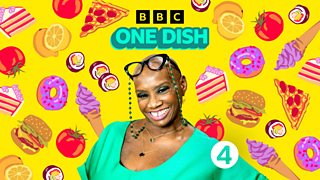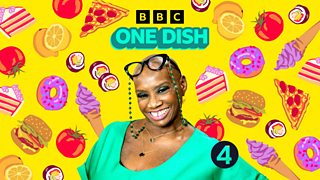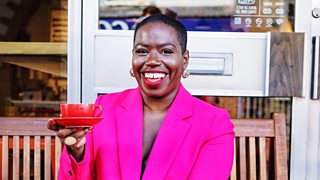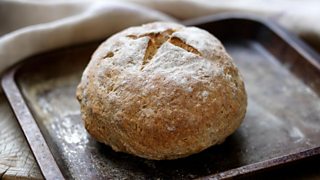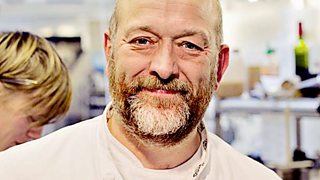The secret power of plantain
In �鶹������ҳ��� Radio 4 podcast One Dish, chef Andi Oliver talks to a famous guest about a food that holds meaning to them. They unpack its secrets, from the history behind how it came to exist, to what memories and associations make it so special. Plus, psychologist and nutritionist Kimberley Wilson pops in to give some scientific insight.
In Episode 5, Andi meets author, journalist and TV presenter Candice Brathwaite to talk about the secret power of plantain.

Plantain is a Caribbean classic
For Candice Brathwaite, plantain is special because of its taste and the “memories it evokes” but also for its connection to the Caribbean. “In some really deep way, I think that dish or that food speaks to my desire to know more about my heritage,” she says. “It just reminds me of a home that I don’t quite know or understand.”
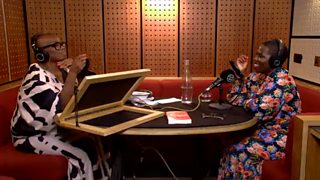
She doesn’t remember the exact time she first ate the dish. “I’m going to take a stab in the dark and say my paternal grandmother made it, in a very sweaty kitchen situation with something going on the Dutch pot and, unfortunately, smoking her tenth fag, at 9am, whilst cooking!” she says, laughing. Candice’s maternal family is Bajan (from Barbados); her paternal side is Jamaican. “Both sides eat plantain,” says the journalist, “so it would have been there.”
Andi agrees that everybody eats it, right across the Caribbean: “I don’t know anywhere that they don’t eat plantain in some way, shape or form,” says the chef.
But plantain didn’t originate in the Caribbean
Plantain is not actually native to the Caribbean. It’s thought to have originated on the Pacific Island of New Guinea, around 8000 BC, from where it travelled along trade routes to Indo-China, Oceania and East Africa.
It was taken first to Santo Domingo (capital of the Dominican Republic and one of the Caribbean’s oldest cities) in the 1500s by a Portuguese monk. The monk first encountered it in the Canary Islands, where it was taken from West Africa by the Portuguese.
Plantain has been a powerful connector of people for generations
Plantain arrived in the Caribbean before slave traders began to transport enslaved people from Africa across the Atlantic in the 1600s, but, enslaved people are very much connected to its story.
Plantains and bananas together are the fourth most important food crop in the world after rice, wheat and maize.
“The people used cooking techniques from home to prepare plantain in the Caribbean and that’s why today there are still lots of similarities between Caribbean and West African styles of cooking plantain,” explains Andi. The same applies to other foods, like okra or cou-cou. It’s what the culinary historian and cookery book writer Dr Jessica B Harris calls the “African hand”. “I imagine all of the pots, down the years, decades and decades and decades, generations of people with their hand in the pot, and it makes me feel quite emotional,” says Andi.
And for Candice, plantain was a connector between her own Caribbean heritage and her husband, who is of Nigerian descent: “Plantain was literally that bridge between us, when he was introducing me to foods which I didn’t quite know or understand yet. He was like, ‘Well babe, just put some plantain with that. Just stick with the jollof and the plantain for now, until you upgrade!’”
PlanTAIN or planTIN?
There’s some dispute over the correct way to pronounce Candice’s favourite dish. She is adamant that the correct pronunciation is “plantin” (similar to mountain, fountain or captain). But there are many others who are just as passionate about it being pronounced “plantain” (as in drain, plain or maintain).
“The beef is real on social media,” says Candice. “They’re like, ‘Are you a plantainer or a plantinner?’ I’m like, ‘It’s planTIN!’” Andi concurs: plantain is “fancy” and it’s plantin all the way…
Plantain is “likkle but tallawah”
Plantain is “sturdy but sweet,” says Candice. “Likkle but tallawah, as my dad would say.” (Likkle but tallawah, explains Andi, is patois for a person who is small but mighty. “It’s more than strong because it indicates a sense of spirit.”)

“Plantain to me is likkle but tallawah because it’s normally the side to your main meal, but then once you’ve eaten, it’s all you can think about,” says Candice. “You know that it’s nourishing but it also has the sweetness of a dessert.”
When you have the sweet plantain with something like a savoury curry, that’s when the true magic is revealed, says Andi: “There’s a certain beauty to a sweet thing, that lives in a savoury world.”
How you slice plantain affects the flavour
Before frying it, plantain can be sliced into rounds, horizontally into strips, or on the bias. “I’m on the bias,” says Candice. “It’s just the way I was taught to hold it and slice it.” And it turns out there is a reason for this: “When you cut something on the bias, it’s a bigger surface area, which means more natural sugars come out, which means it’s sweeter,” explains Andi.
A taste test confirms this. Neither the slightly “meagre” circular slice or the “too thick” horizontal slice quite have that toffee edge, says Andi. “On the bias, it’s got the toffee, it’s got the caramelisation, it’s got the creaminess, but it’s also robust – the tallawah thing.”
It’s a dish for any time of day
Candice will happily eat plantain from morning to night. “It got to a point where my nan on my maternal side, when plantain used to be three for a pound before inflation, would buy like nine plantains a week for me. She’d be like, ‘Candice, go easy, because I know that if you have your way by Tuesday this done!’”
For breakfast she has it as a side to her “faux” English breakfast. “I say faux because my English is more of a Jamaican breakfast,” she explains. “We spice up the baked beans, we put a little pepper in it.” Andi and her mum will eat it with a fudgy boiled egg, crispy bacon, avocado and a johnny cake. “This is a very Antiguan breakfast,” says the chef.
“For lunch, I love a plantain sandwich, not even gonna lie,” says Candice. “Dinner: rice, peas, jerk chicken, plantain. That’s me.”
Listen to One Dish on �鶹������ҳ��� Sounds
More from �鶹������ҳ��� Radio 4
-
![]()
One Dish
What’s the one dish that holds a special place in your heart?
-
![]()
Woman's Hour: Candice Brathwaite, Protests, Misogyny
The programme that offers a female perspective on the world.
-
![]()
The surprising history of soda bread
Andi Oliver meets Briony May Williams to talk about the magic of soda bread.
-
![]()
The Food Programme: Plantains and Pleasure
Tim Hayward on the evolution of Jamaican food in the UK with chefs and cooks in Bristol.
